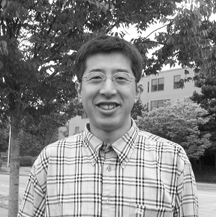Director's Digressions
DO-IT staff survived another Summer Study with more than fifty teens living in a campus dormitory. These energetic young people made at least one of us feel her age. They share some of their experiences with you in this issue of DO-IT NEWS.
Soon after the summer wound down, visiting scholar Mamoru Iwabuchi joined the DO-IT staff. He'll be with us in Seattle for one year. Welcome, Mamoru! I'll let you introduce yourself to our readers...

Hello. My name is Mamoru Iwabuchi. I am a visiting Scholar at the University of Washington (UW), working at DO-IT for one year. Before I came to Seattle, I had two jobs at Hiroshima University in Japan. One job was working as a coordinator to support students with disabilities. This experience helped me learn things similar to what DO-IT also does. The other job, which I still have, is teaching computing and adaptive technology at the Faculty of Education. Many of the students there would like to be teachers one day. I believe that it is important to educate everyone in knowing useful techniques and technologies for people with disabilities in educational settings.
Before working at Hiroshima University, I was in Scotland for three years. During my stay, our team at the University of Dundee developed a symbol-based multilingual communication software program. Users could choose words on the system and build sentences in English. When finished, the message would be translated into another language, e.g., Japanese. The system design was based on the technologies of AAC (Augmentative and Alternative Communication) and was useful for non-speaking people. The system could also be useful for speaking people in other situations with communication difficulties, such as traveling in a foreign country. You might need our software too if you went to the wonderful bagpipe country. Personally, I had communication difficulties in Scotland. However, would you believe that the main reason was not my English but their bonnie accent? I hope you find a wee bit of Scottish accent in mine.
My involvement with DO-IT began two years ago when Director Sheryl Burgstahler visited Japan. I was an interpreter for Sheryl as she gave a conference presentation on helpful supports for the success of students with disabilities in higher education. Since then, I have dreamed about working at DO-IT. How wonderful that I am here now! I am interested in learning about all of DO-IT's various projects, not only those related to my specialties in AAC and adaptive technology. I am also very interested in learning more about the people and culture of the United States. Sheryl and her family have already started their lessons on how to build a treehouse.